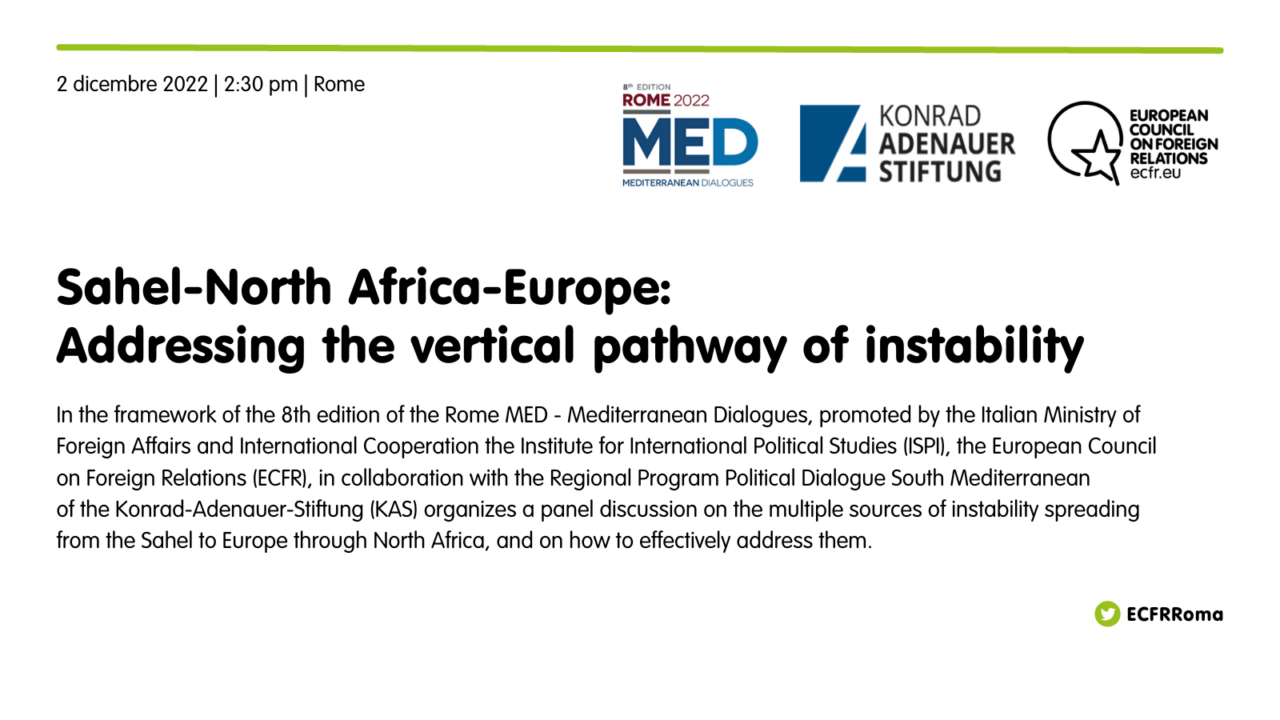Sahel-North Africa-Europe: Addressing the vertical pathway of instability
A panel discussion organized in collaboration with the Regional Program Political Dialogue South Mediterranean of the Konrad-Adenauer-Stiftung (KAS) in the framework of the 8th edition of the Rome MED – Mediterranean Dialogues, promoted by the Italian Ministry of Foreign Affairs and International Cooperation the Institute for International Political Studies (ISPI)
In the framework of the 8th edition of the Rome MED – Mediterranean Dialogues, promoted by the Italian Ministry of Foreign Affairs and International Cooperation the Institute for International Political Studies (ISPI), the European Council on Foreign Relations (ECFR), in collaboration with the Regional Program Political Dialogue South Mediterranean of the Konrad-Adenauer-Stiftung (KAS) organizes a panel discussion on the multiple sources of instability spreading from the Sahel to Europe through North Africa, and on how to effectively address them.
Throughout the last decade Libya and the Sahel have increasingly emerged as hotbeds of instability where migration flows, terrorist threats, conflicts and political unrest are intertwined, and where the increasing involvement of external actors has also had a strong impact on security dynamics. Given the deep security, economic and political interests that European countries hold in the macro-region at stake, this situation has raised growing concern in Europe and has pushed the EU and European countries – namely those with the biggest stakes in the Mediterranean basin such as Italy – to progressively integrate the Sahel countries, whose dynamics are directly reflected on North Africa and in turn on Europe, in their vision of the Broader Mediterranean, thus trying to go beyond a foreign policy vision based on static regional blocs. Nevertheless, this growing awareness has not yet translated into a coherent and comprehensive European strategy to tackle the multidimensional and transnational sources of instability emerging from this macro-area at their very roots. At the same time, the promotion of stability is a necessary condition to allow the development of the economic potential of the countries of this macro-area, whose sustainable and fair growth could in turn have a positive socio-economic and political impact at the local level and open-up new pathways for cooperation with the EU and European countries.
Agenda
Key note: Emanuela Del Re, UE Special Representative for Sahel and ECFR Council Member
Speakers:
- Djimé Adoum, High Representative of the Coalition for the Sahel
- Zuzana Brixiova Schwidrowski, Director, North Africa at UNECA
- Natalina Cea, Head of Mission, EUBAM Libya
- Stefania Craxi, President of the Foreign Affairs and Defence Commission, Italian Senate
- Hélène Le Gal, Managing Director for the Middle East and North Africa, EEAS
- Tarek Megerisi, Senior Policy Fellow, ECFR
- Abdul Salam Bello, Alternate Executive Director of the Africa Group II, World Bank Group Board of Directors
- Thomas Volk, Director, Regional Program Political Dialogue South Mediterranean, KAS
Chair: Ali Aslan, International TV Presenter and Journalist

